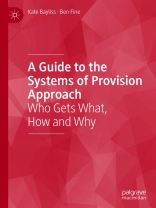Understanding consumption requires looking at the systems by which goods and services are provided – not just how they are produced but the historically evolved structures, power relations and cultures within which they are located. The Systems of Provision approach provides an interdisciplinary framework for unpacking these complex issues.
This book provides a comprehensive account of the Systems of Provision approach, setting out core concepts and theoretical origins alongside numerous case studies. The book combines fresh understandings of everyday consumption using examples from food, housing, and water, with implications for society’s major challenges, including inequality, climate change, and prospects for capitalism.
Readers do not require prior knowledge across the subject matter covered but the text remains significant for accomplished researchers and policymakers, especially those interested in the messy real world realities underpinning who gets what, how, and why across public and private provision in global, national, and historical contexts.
Tabella dei contenuti
Chapter 1 – Introduction: Background to the So P Approach.- Chapter 2 – The So P Approach: Theoretical Background and Empirical Practice.- Chapter 3 – Understanding Material Cultures.- Chapter 4 – Insights from Operationalizing the So P Approach.- Chapter 5 – A So P Approach to Understanding Food Consumption.- Chapter 6 – Conclusion – The Contribution of the So P Approach.
Circa l’autore
Dr Kate Bayliss is a Research Fellow at the School of Oriental and African Studies, SOAS, University of London, UK, and Visiting Researcher at University of Leeds, UK. She has researched the nature and impact of privatization in provisioning infrastructure and essential services for over two decades, working with UN and other agencies. She has worked on Systems of Provision as Senior Research Fellow at the University of Leeds under the Living Well Within Limits Project, https://lili.leeds.ac.uk/, and at SOAS under the FESSUD project, especially for water, health, housing and energy, http://fessud.eu/
Professor Ben Fine is Emeritus Professor of Economics, School of Oriental and African Studies, SOAS, University of London, UK. He has (co)authored or edited over thirty books and published over 250 articles, with strong commitment to interdisciplinarity. He served for a decade as a founding member of the Social Science Research Committee of the UK’s Food Standards Agency, chairing the Working Group on Reform of Slaughterhouse Controls. He has advised UNDP, UNRISD, UNDESA, UNCTAD, Oxfam and other progressive civil society organizations and trade unions. He led the FESSUD programme on the financialization of systems of provision. He is Chair of the International Initiative for Promoting Political Economy, http://iippe.org/












